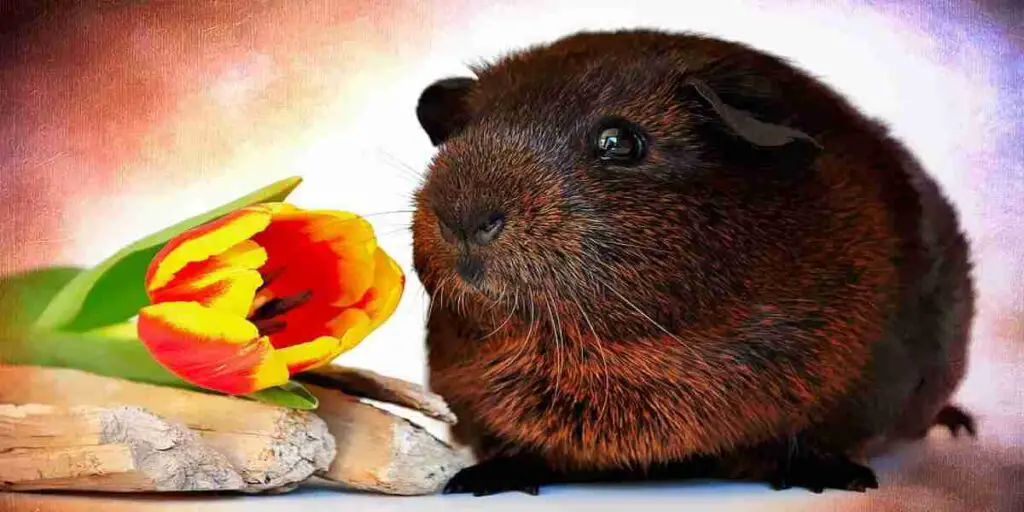
As guinea pig owners, we are often curious about the safety of different foods and plants for our beloved pets. One such question that arises is whether guinea pigs can eat tulips. In this blog post, we’ll explore the topic of guinea pigs eat tulips, discussing the potential risks, precautions, and guidelines for feeding tulips to guinea pigs.
Table of Contents
Can guinea pigs eat tulips?
No, guinea pigs should not eat tulips. Tulips, along with many other members of the Liliaceae family, contain toxins that can be harmful to guinea pigs if eaten.
These toxic compounds, such as tulipalin A and B, can cause various negative effects on their health. It’s important to prioritize your guinea pig’s well-being and avoid feeding them tulips or any other plants that are poisonous.
Possible Dangers of Tulips for Guinea Pigs
Tulips contain alkaloids and other chemicals that can cause digestive problems, mouth irritation, and other health problems in guinea pigs.
Drinking tulips can cause symptoms such as lethargy, loss of appetite, diarrhea, and in some cases more serious complications.
Because of the potential dangers and toxicity, it is very important to ensure that guinea pigs do not have access to tulips or any part of the plant, including leaves, stems, bulbs or flowers.
Safe and nutritious alternatives
Instead of tulips, focus on providing safe and nutritious food for your guinea pigs. Guinea pigs require a diet consisting primarily of fresh grass, high-quality pellets, guinea pig-safe vegetables, and occasional fruit.
Choose vegetables like bell peppers, cucumbers, and leafy greens, and fruits like apples and strawberries for occasional meals. It is always important to introduce new foods slowly and monitor your guinea pig’s response to ensure their health.
Ensuring a Guinea Pig Friendly Environment
Creating a guinea pig-friendly environment goes beyond their diet. It also means keeping them away from plants, including tulips, that can pose a threat to their health.
If you have tulips or other potentially poisonous plants in your home or garden, make sure they are out of your guinea pigs’ reach. Additionally, be careful when letting your guinea pigs roam outside, as they may encounter plants that can be harmful to them.
Are tulips safe for guinea pigs
No, tulips are not safe for guinea pigs to eat. Tulips belong to the Liliaceae family, and many plants in this family, including tulips, contain toxic compounds that can be harmful to guinea pigs if ingested.
These toxins can cause digestive problems, oral irritation, and other health problems. Keeping tulips and other potentially harmful plants away from your guinea pig is important to ensure their health.
What flowers can guinea pigs not eat
There are several flowers that guinea pigs should avoid eating because of their potential toxicity. Some examples of flowers that are not safe for guinea pigs include daffodils, lilies, hyacinths, azaleas, and tulips.
These flowers contain toxic compounds that can cause various health problems if ingested. It’s important to research and be aware of which flowers are safe for your guinea pigs and make sure they don’t have access to any poisonous plants.
Are Tulips Pet Friendly
No, tulips are not considered pet friendly, especially for small animals such as guinea pigs as the toxic compounds in tulips can be harmful if eaten by pets.
It is important to create a safe environment for your guinea pigs by keeping tulips and other potentially poisonous plants out of their reach.
Is it safe to eat tulips
No, tulips are not safe for humans or animals to eat, including guinea pigs. Tulips contain toxic compounds, such as tulipalin A and B, that can cause adverse health effects if eaten.
These effects can range from digestive upset to more serious complications. Tulips are grown primarily for ornamental purposes and not for consumption.
Also Read:
- Can Guinea Pigs Eat Baby Leaf Salad
- Can Guinea Pigs Live In The Garage
- Can Guinea Pigs Stay In Garage
Conclusion
Finally, guinea pigs should not eat tulips or any other plants known to be poisonous. Tulips contain substances that can be harmful to guinea pigs and cause various health problems.
It is important that you prioritize the well-being of your furry friends and provide them with safe and nutritious food that meets their specific nutritional needs. Avoid offering tulips or any part of the plant to guinea pigs, and focus on providing them with a balanced diet of hay, pellets, and guinea pig-safe vegetables and fruits.
If you have any concerns or questions about specific foods or plants for your guinea pig, consult a veterinarian to ensure their safety and health.
